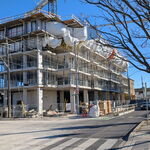A lot wrong here.
1. An 8-lane highway has about a 50 metre cross section, and can go narrower if you are willing to sacrifice shoulder width.
I-90 in Boston fits 8 lanes of freeway traffic in a ~32 metre wide trench. There should theoretically be lots of options to realign and consolidate hydro towers to accommodate that, with enough money involved.
2. I've said this multiple times on this board - Sydney, NSW has recently opened a ~22km, 6-8 lane tunneled expressway and is expanding it to a network of over 40km of tunneled expressway. The 401 Tunnel is undoubtedly.. ambitious. It's almost certainly a waste of money (especially if it ends up as a 55km tunnel), but it''s not a "Springfield type monorail". There is global precedent. Expressway tunnels would also probably be dug with Sequential Excavation, like how Sydney and the Ottawa LRT was completed, which allows wider tunnel shapes to accommodate multiple vehicle lanes.
I think we should wait and see what is actually proposed before passing judgement.. If it's as absurd as people are making it out to be, sure, we can issue that judgement at that time. But let's see how creative MTO can get.




